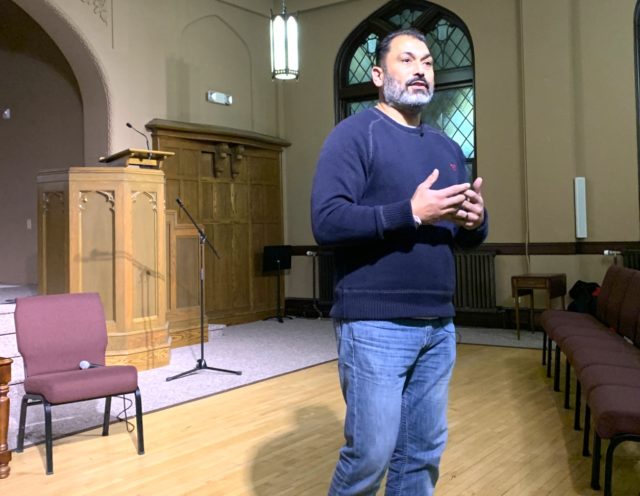Pardeep Singh Kaleka and Arno Michaelis, Serve 2 Unite co-founders and the authors of “The Gift of our Wounds,” visited The Crossing campus ministry to give a public talk on hate, extremism, and forgiveness on the night of Nov. 12.
“I continuously go out of my way to find people who don’t agree with me,” Kaleka said.
After a white supremacist murdered Kaleka’s father Satwant Singh Kaleka along with five others at the Sikh Temple of Wisconsin on August 5, 2012 in Oak Creek, he began working toaward peace and tolerance. The shooter was a member of the neo-Nazi skinhead gang Michaelis had helped to found in 1989. The two met for dinner in October 2012, shortly after they began working together.
Michaelis, a reformed white supremacist, spoke to a group of students about his conscious decision to leave the movement. He said he found himself exhausted after having a daughter and becoming a single parent. Now, Michaelis said he values diversity and spends his time attempting to decrease hate in the world.
“Anything worth believing is worth challenging,” Kaleka told the audience during the public talk.
He asked the audience to reflect on their own personal beliefs about other people, groups, and the world we live in. Kaleka said some people hold on to ideas about others because of comfort or to avoid looking at the problems within themselves.
He also said shame contributes to others making poor decisions. Kaleka believes people should address their shame in order to recognize bad decisions and learn from them.
“The difference between guilt and shame is that guilt is when you’ve done something wrong and shame is when you feel wrong,” he said.
Kaleka said the shooter attacked the temple in 2012 because of his own shame associated with his own shortcomings in life. He said it was easy for him to blame the larger concept of immigration.
“He [the shooter] thought that not only did we belong in this community but we didn’t belong in this world,” he said.
Michaelis said recruiters for white supremacist movements and other extremists movement often prey on others’ frustrations, blaming them on an external group. Kaleka also said after the shooting, a lot of members of the Sikh community began to question their place in society.
“When they passed, I felt a sense of relief saying at least they died in a place of peace, a holy place,” he said.
Since the shooting, Kaleka became a licensed trauma therapist fostering healing and growth for his patients. He and Michaelis now work together to decrease divisions within society and promote conversation from people of different backgrounds.
“Responding to Hate” Public Talk and Student Workshop was co-sponsored by The Morgridge Center for Public Service and the Sikh Student Association at UW-Madison alongside a number of faith and community organizations.


































